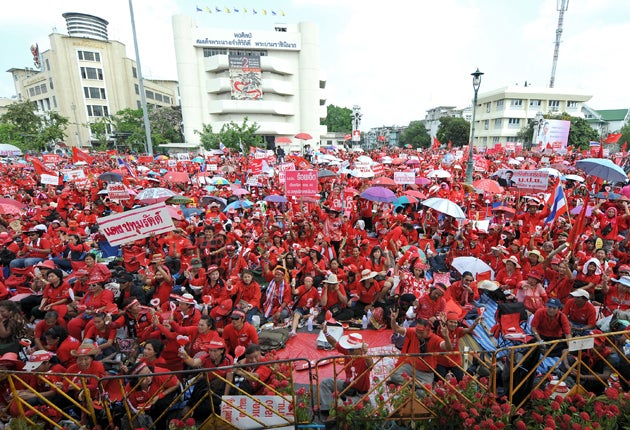Tens of thousands of protesters call for Thai elections

Tens of thousands of protesters converged in Bangkok on today and gave Thailand's military-backed government an ultimatum: call elections in 24 hours or face crippling demonstrations across the capital.
About 80,000 red-shirted supporters of former prime minister Thaksin Shinawatra, ousted in a military coup in 2006, arrived in trucks, cars and motorbikes from rural provinces over the weekend, carrying red flags as loudspeakers blared music about democracy and freedom.
Tens of thousands more protesters were expected by Sunday evening.
Investors worry that any violence could derail a nascent recovery in Southeast Asia's second-biggest economy.
Protest leaders insist the rally will be peaceful even if it lasts for days. They plan to maintain pressure on Prime Minister Abhisit Vejjajiva to dissolve parliament and call an election Thaksin's allies would be well-placed to win.
"We're asking the government to relinquish power and return it to the people," said Veera Musikapong, chairman of the protest group, United Front for Democracy against Dictatorship, setting a deadline of noon Monday for parliament to be dissolved.
If that is not met, they will march throughout Bangkok, said another protest leader, Nattawut Saikua, raising the prospect of paralysing many of the capital's already-congested streets.
Abhisit must go to the polls by the end of next year. In his weekly radio address on Sunday, he indicated immediate elections were unlikely, citing the tense political climate and his coalition government's parliamentary majority.
Several main roads near government offices were blocked off either by protesters' pick-up trucks and motorcycles or cordoned off by police and soldiers. This could prevent civil servants and the prime minister from going to work on Monday.
Thailand deployed 50,000 police, soldiers and other security forces across Bangkok after government warnings of potential sabotage, including bombings and arson. Several foreign embassies urged their nationals in Bangkok to be cautious.
"It may get more volatile after a few days as the protest leaders step up their measures and people are tired and frustrated," National Security Council Secretary General Thawil Pliensri told Reuters. "We have to make sure there is no damage."
Protesters accuse the government of scaremongering.
The latest turbulence adds to a seemingly intractable political crisis that broadly pits the military, urban elite and royalists, who wear the revered king's traditional colour of yellow at protests, against the mainly rural Thaksin supporters.
The protesters say the British-born, Oxford-educated Abhisit came to power illegitimately, heading a coalition the military cobbled together after courts dissolved a pro-Thaksin party that led the previous coalition government.
Crowds gathered under tents and umbrellas, sitting on plastic sheets and mats listening to speeches and folk songs on stage. Intense midday heat drove many indoors or to find shade, but the crowd was expected to return in the evening.
"This government angers me. I never cared much about politics until a few years ago when it becomes so clear they are trying to hold onto power at the expense of people like us," said Teerachai Sukpitak, a farmer from northeast Leoi province.
The protesters chafe at what they say is an unelected elite preventing allies of twice-elected Thaksin from returning to power through a vote.
Adding to their anger, Thailand's top court seized $1.4 billion of Thaksin's assets last month, saying it was accrued through abuse of power.
"We are here to ask for justice and for rule of law to be applied to all," one protest leader, Weng Torirajkan, told cheering supporters. "The government cannot do it because it's too busy serving the elite."
Thailand was plagued by political upheaval in 2008 when yellow-shirted protesters who opposed Thaksin's allies in the previous government occupied the prime minister's office for three months, and then blockaded Bangkok's international airport until a court ousted the government.
Thaksin, a 60-year-old former telecommunications tycoon, has lived in self-exile mostly in Dubai since he was sentenced to two years in prison in 2008 on graft charges. He spoke to supporters by video link from an undisclosed location in Europe late on Saturday, urging them to rally together to topple the government.
"Keep good health, be patient and stay strong," he said. "The more they bully me, the more I will fight."
He is beloved in the vote-rich north and northeast after becoming the first Thai leader to win election twice, both in landslides, largely by reaching out to the poor through unprecedented populist policies such as universal healthcare.
His critics accuse him of authoritarianism, corruption and undermining the monarchy.
Subscribe to Independent Premium to bookmark this article
Want to bookmark your favourite articles and stories to read or reference later? Start your Independent Premium subscription today.

Join our commenting forum
Join thought-provoking conversations, follow other Independent readers and see their replies